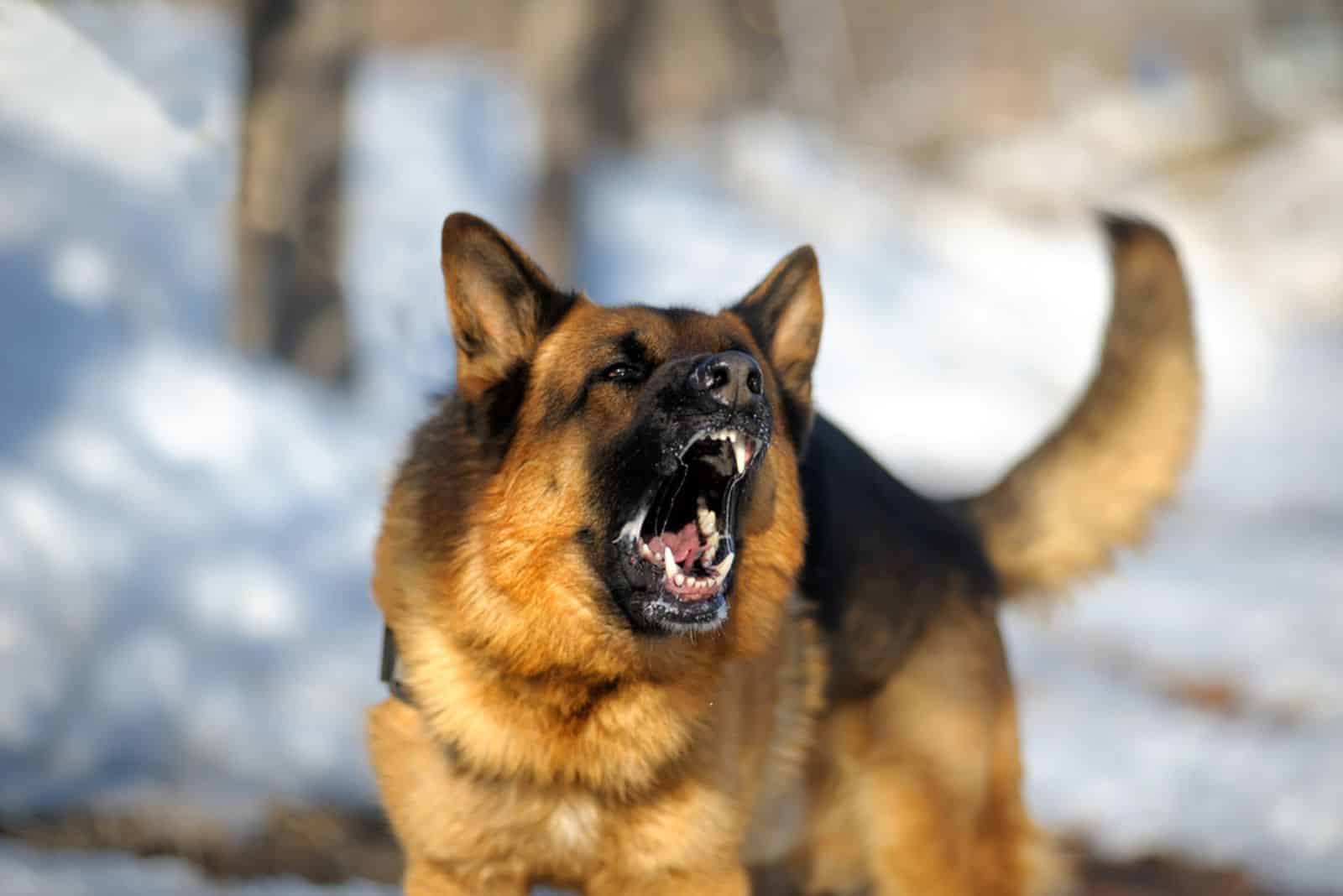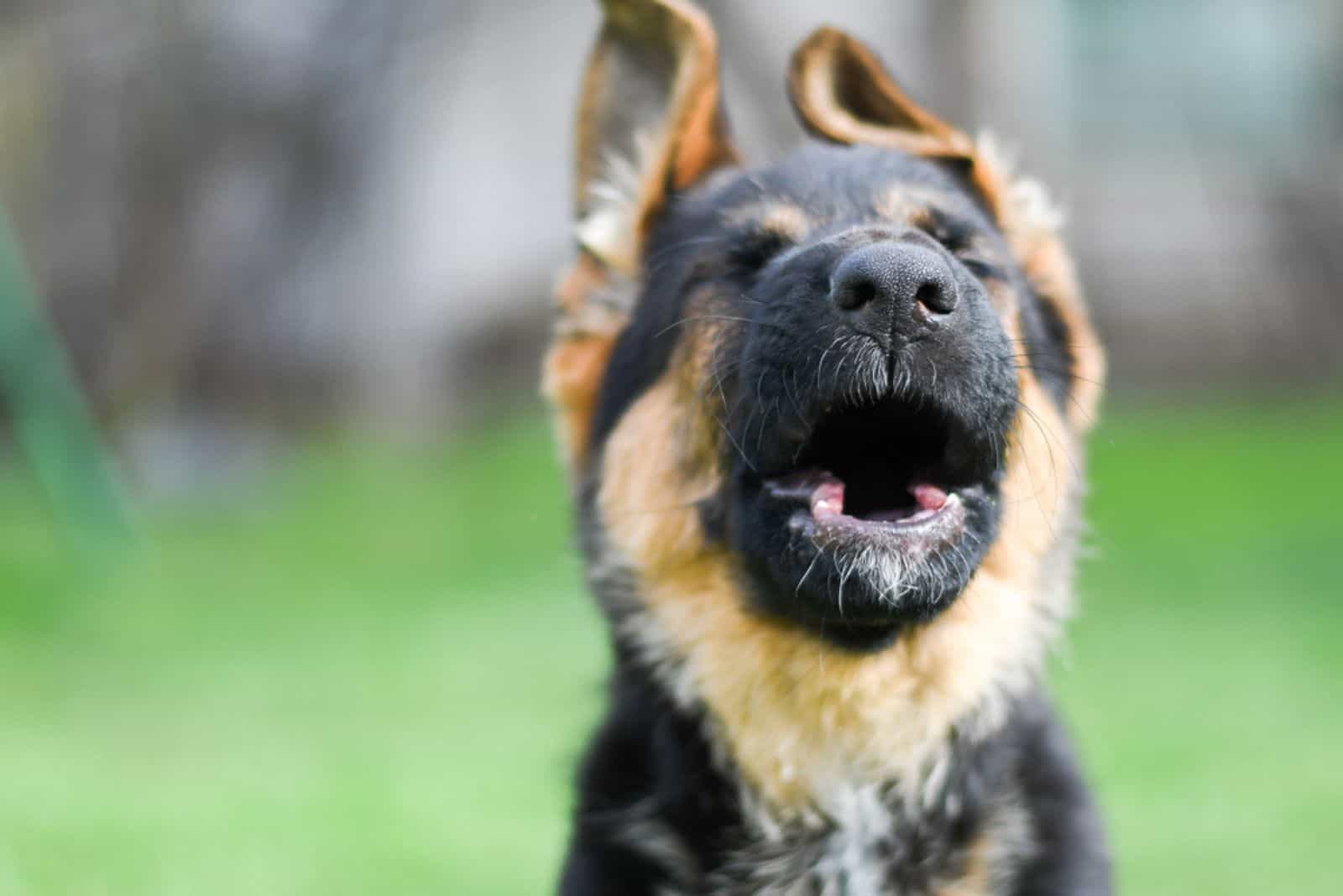Though unable to use human language, dogs have cultivated their own method of communication over the years to better relay their feelings, especially GSDs, and that’s why you’ll often find dog owners asking, why does my German Shepherd make weird noises?
Well, the reason as to why your German Shepherd makes weird noises is precisely that, he’s trying to communicate his feelings or his current state.
Though it largely depends on your definition of weird, the noises they use can essentially be boiled down to words or phrases depending on the context in which they’re used.
By that, I mean that no piece of canine body language is only ever made from a singular part and that there are multiple pieces to this communication puzzle.
After all, dogs aren’t simple, especially someone as disciplined as the German Shepherd, and these messages can express a wide range of emotions from anger and boredom, to sadness and satisfaction.
And, as always, it’s up to us to decode them and know what exactly they mean, so if you’d like to find out what some of the most common gestures with auditory elements for German Shepherd are and what they mean, be sure to read on.
Why Does My German Shepherd Make Weird Noises: The 7 Main Reasons
1. Barking

Albeit the least peculiar noise, barking is the one of the more common ones and it can have a multitude of different meanings depending on the tone, pitch and frequency of the bark among other bits of body language.
Read Next: Why Does My German Shepherd Stare At Me: 15 Possible Reasons
The standard bark that we experience most commonly is either trying to alert you of a particularly dangerous situation, or it’s just your GSD defending his territory and warning others about it.
When the bark isn’t repeated and is instead a bit lower and directed at you, intonated in such a way that it almost sounds like he’s saying “Gimme!”, then you’re likely holding something that he’s eager to get, be it a bone, a treat, or a fetch toy for him to chase after.
When it has a higher pitch to it and it sounds almost like a repeated cry, then it’s your dog showing that he’s afraid of something. This one is usually followed alongside a tucked tail and some restlessness.
If the higher pitched barking alongside the restlessness is instead followed by a wagging tail (and likely a big boy rushing toward you), then it might be that he missed you greatly and is just glad to see you again.
Do be careful of this one as GSDs can and will tackle you unintentionally, not realizing their own strength.
And, finally, if your dog is using a lower pitched bark, spaced out a bit more than the usual barking would, and is directed at someone or something, then he’s expressing his frustration over something.
This is most commonly the next stage after his demanding barks aren’t met the first few times.
2. A Whimper
Nothing is as hurtful as seeing a German Shepherd crying, but whining isn’t always the sign of your dog being emotionally upset.
Other reasons for that could be trying to express that he’s in some form of physical pain.
Whether the cause of it is visible or not depends on said cause, but there’s something clearly wrong with your pooch that needs to be looked into, and the vet is your best bet if you can’t discern it yourself.
Another reason is a similar one to that of one particular bark, expressing frustration, albeit in a more upset tone than the barking one would be, when he doesn’t get what he wants.
Finally, it could also be a small, apologetic bark, done once or twice after your dog does something he knows he wasn’t supposed to and you’ve caught him red handed, so now he’s trying to apologize.
3. Coughing Or Sneezing

Arguably some of the most unexpected and somewhat startling noises when you hear them the first time are German Shepherds coughing or sneezing.
Sudden and arguably very odd sounds when heard at first, though they can turn quite funny over time.
That said, their cause is nothing to laugh at as these are usually signs of some potential health issue.
If a sneeze or a cough happens once every now and then, then it shouldn’t be a big problem as it’s most likely just a brief irritation that caused it.
Though, if the act is constant or repeated, then it’s likely a sign of nasal inflammation or a sinus infection, at least in the case of sneezers.
Coughing is the more serious one in this case as constant coughs that don’t seem to go away could be telling of a problematic health issue like heartworm, kennel cough, a lung infection or some form of heart disease, among other potential issues.
There’s also something called a reverse sneeze, one that resembles a funny honking noise.
Certainly the rarest kind of sneezing behavior and it may sound too weird to consider it a positive, know that it’s merely something that happens if your dog is assailed by multiple irritants at once, causing the noise amalgamation known as the reverse sneeze.
Normally it’s nothing to worry about if it just happens every now and then, but if it turns into something more frequent, be sure to give your dog’s vet a call to check if there isn’t some particular obstruction in his system.
4. Howling
Another common act that may seem weird to some is a German Shepherd howling, though it shouldn’t be as it’s a remnant of their lupine ancestors.
The main use for howling for all dogs, not just GSDs, is to announce their presence to fellow dogs in the neighborhood. Irritating for some of us who like sleeping at night, sure, but it’s something that’s built into them, so cut them some slack.
The other meaning for howling, a rarer one, is when your dog is howling for you. He’s likely feeling lonely and hasn’t seen you in a while so he’s worried, like a mother trying to call their child to come back for dinner when he’s late.
Rarer still, is the act of howling along to some tune or other sound that vaguely resembles howling itself, usually a song or a siren of some kind, and that one can be admittedly funny to listen to.
5. Grunting

Grunting is another noise which may come off as weird coming off your German Shepherd, but the peculiar factor is mostly derived from how infrequent this occurrence can be.
It can be a noise that either expresses a positive or negative emotion.
If the grunting is followed by very erratic movement in place like your dog lowering his front half while his paws pitter patter in front of him and his tail is going wild, then he’s just delighted to see you or whatever delicacy you’ve brought him.
Do note that this may be followed up by a tackle, so be prepared!
This behavior is more common the younger the dog is, particularly in pups as they may not have learned more complex methods of communication.
It can also be a sign of satisfaction, particularly when the grunt is brief. This one you’ll usually hear when you have an exhausted dog and he finds a really good place to sleep, letting out a grunt of contentment.
On the other hand, grunting can be negative too, though mostly when it’s happening too often or it appears like an involuntary spasm.
This normally hints at some form of obstruction in the dog’s airways, chest pain or some form of health problem and is a good sign to take him to the vet to figure out, and hopefully treat, the root cause of the issue.
6. Sleeping Noises
Whether it’s snoring or a variety of other noises created while sleeping, it’s usually going to be something not too dangerous, but it may come off as weird or unsettling in some cases.
Just like sleep talking, most dogs will end up producing their own form of speech in their sleep from time to time, be it a bark, a growl, a grunt, or anything similar.
This is just them sleeping and having a dream, and the REM process slips out a brief lapse and vocalizes the actions in the dog’s dreams into the waking world without waking the host himself.
Snoring is the only one that could indicate a form of mild concern really as more frequent occurrences could be a sign of a health issue like obesity, hypothyroidism or sleep apnea, to name a few.
The occasional snore is fine as it can happen at random, but if it has gradually become more common and constant, then it may be time to pay the vet a visit to find out what the issue may be.
7. Growling

The final noise that may sound weird at times would be growling.
While normally a reaction of the dog that indicates that someone is trespassing on his territory and that he’s warning them to back off, it can also happen due to a variety of other reasons.
It can also be something that’s produced to show the German Shepherd’s discontent with a particular action, especially when something is done to him that he doesn’t like or approve of.
That said, it can also mean that he’s enjoying himself when the growling is involved in play time without the follow-up whine of someone getting hurt like playing tug of war with you or a fellow canine.
Finally, it can also be a sign of your German Shepherd being in pain and him just trying to tough it out so as to not show weakness.
Are There Any Noises I Should Be Particularly Concerned About?
A few, but they themselves aren’t the final symptoms of something bad, just an early indicator to act before the cause of said symptom gets too out of control.
You’ll mainly want to be concerned by excess coughing, whimpering followed by some standard symptoms that point to health problems like weakness or restlessness, and frequent snoring to a degree.
In Conclusion
Why does my German Shepherd make weird noises? The answer is that it’s simply part of their natural body language spectrum and that the only weirdness really comes from how frequently a particular noise is used in the specific context.
Most of the noises dogs make are going to be something that you’ll experience a handful of times during their lifetime regardless.
But, if they’re showing the signs I’ve mentioned above alongside the corresponding behavior, that’s when it’s considered ‘weird’ to some first time dog owners.
If there’s a noise you’re particularly concerned about that you can’t decipher the meaning of yourself, phone up a vet and ask them for advice on the matter.
They’ll help enlighten you on the meaning behind it and will tell you whether it’s something you should be concerned about or not.
Until next time, pet parents.
RELATED LINKS:
